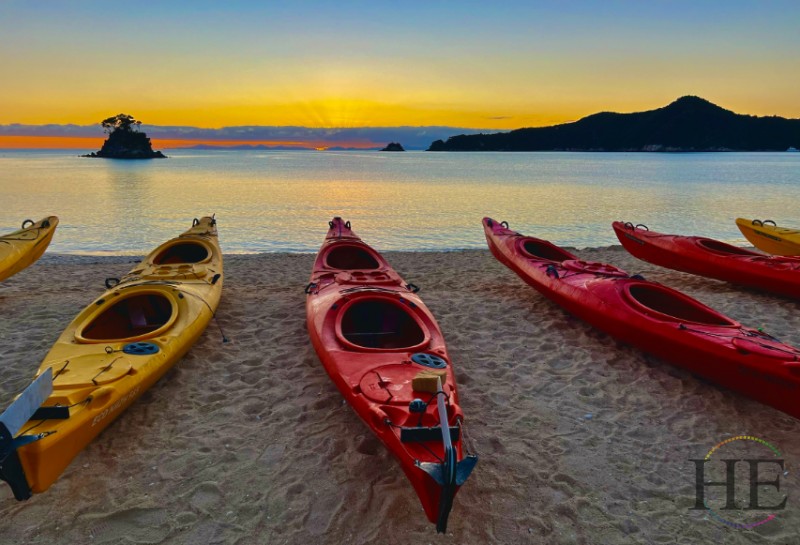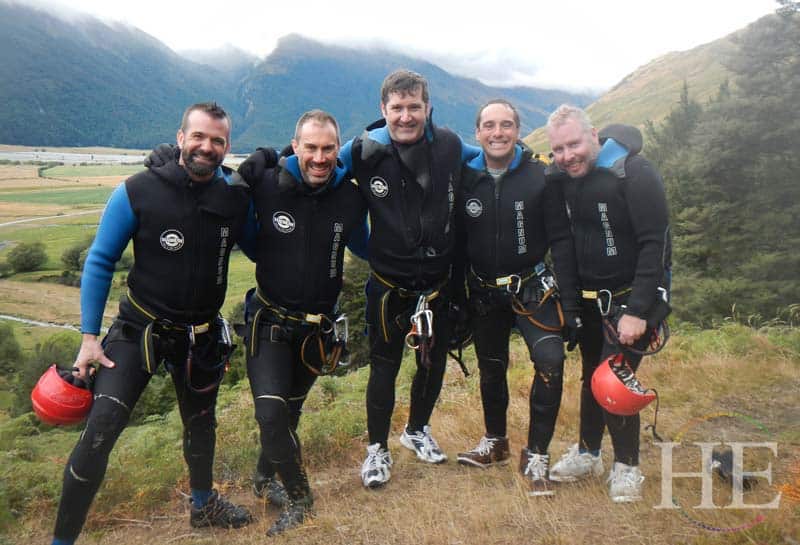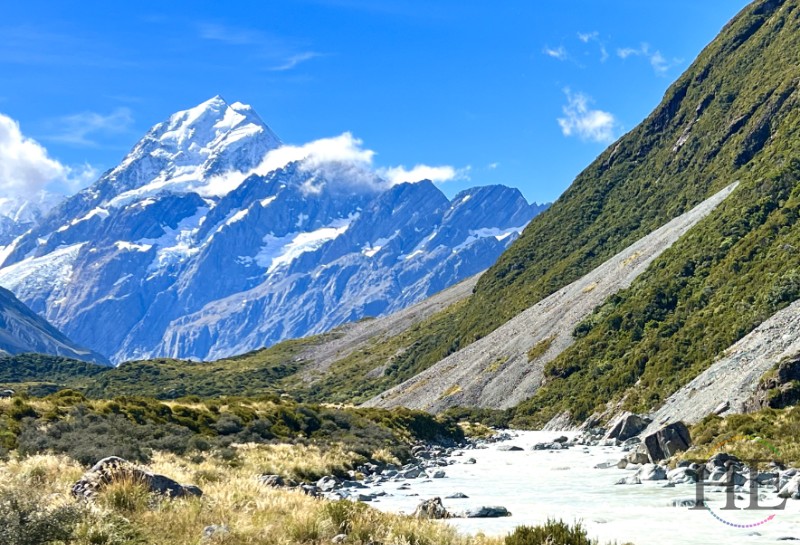The Wild Kiwi: Gay Travel New Zealand Adventure Tour
A Gay Travel New Zealand Adventure Tour
Prices listed are per person:
Shared Room: $6998
Private Room for 11 of 13 nights: $8098
Private Room: $8798
Our Gay Travel New Zealand Adventure happens in the adventure capital of the world! The variety and depth of natural beauty of this isolated South Pacific island group will impress and inspire you. Enjoy hiking trails and glaciers, kayaking, biking, canyoning, rafting, and bungy jumping, plus, of course, wonderful meals and excellent NZ wines! Read about New Zealand’s native Māori culture and how they celebrate their gay children on our Gay Travel Blog.
Highlights
Hike multiple times, including hikes along the shores of Abel Tasman National Park (one of NZ’s Great Walks), then up a glacially active valley underneath the country’s highest peak, and later hike into the high alpine region to view spectacular waterfalls tumbling off of Rob Roy Glacier.
Bike on a couple of days: enjoy a leisurely, full-day bike tour at the top of the South Island, and later, enjoy a fun riverside ride in the morning to the bungy bridge near Queenstown.
Immerse yourself in the beauty of Abel Tasman National Park, a coastal wonderland, where you can choose to either sea kayak, hike or simply take the boat from lodge to lodge during our three days exploring the golden beaches and the protected marine reserve, while enjoying oceanside lodges each evening.
Sea kayak or cruise through a long inlet of a collapsed volcanic caldera near Christchurch, hopefully accompanied by some of the smallest dolphins and maybe even a few of the smallest penguins in the world.
Star-gaze into the skies to find the Southern Cross and southern constellations, and learn Māori legends, all while relaxing in hot pools located next to a glacial lake.
Slide, splash, leap, and rappel down a spectacular deep chasm, in the distinctly down-under sport known as canyoning.
Refuel and revive from our adventures with farm fresh produce, fresh Pacific seafood, and, of course, a glass of the famed local Pinot Noir, Sauvignon Blanc, or microbrew.
Explore Queenstown beauty – wandering on foot, by bike, whitewater raft, and bungy!
Choose from many other adventures: mountain biking, jet boating, paragliding, horseback riding, vineyard tours, Lord of the Rings tours, & a spectacular Milford Sound day-trip by light aircraft, among others.
Overview
From Mountain Hikes to Sunny Beaches
New Zealand — particularly Queenstown and the South Island — is frequently called the adventure travel capital of the world. On this trip, you’ll quickly see why. With our friendly gay and lesbian group, you’ll enjoy not only the activities New Zealand offers but its varied landscape and scenery.
Take the sparkling lakes of Italy and the deep-cut fjords of Norway, the snow-capped Alps of Switzerland and the glistening glaciers of Alaska, the aquamarine waters of Greece and the Highland hiking trails of Scotland: now pack it all onto one small island — and you’ll be shocked by how much room is still left for sheep. That’s New Zealand.
As a Wild Kiwi, you’ll enjoy a new activity every day. Alpine and coastal hikes, sea kayaking, biking around vineyards, along rivers and across suspension bridges, star-bathing under the Southern skies, canyoning through a natural waterpark of chutes, pools, waterfalls, and slides, rainforest hikes, and even a bungy jump, are just a few of the activities that await you. Or just relax and enjoy the serene beauty that surprises around every corner.
Itinerary
Day 1: Sunny Nelson
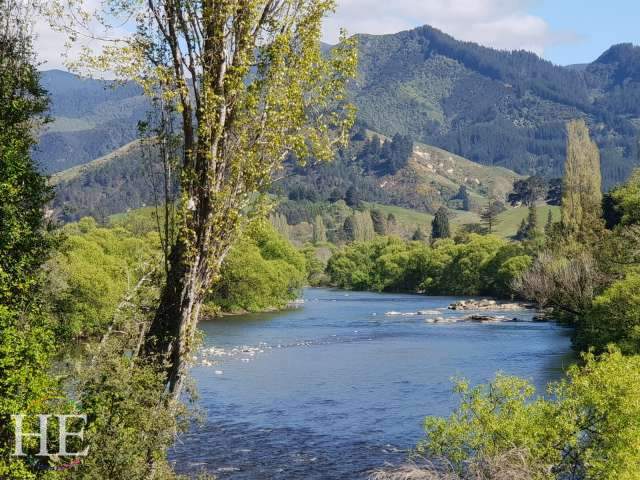
We begin in cheerful Nelson, at the northern tip of the South Island. This pleasant fishing port and crafts community gets more sunlight than any other spot in New Zealand and offers a warm introduction to local hospitality during our two-night stay.
Linger over coffee at a sidewalk cafe. Browse in the galleries. Hikers will enjoy The Center of New Zealand Walk, which departs right from town with spectacular views of the bay. Or simply head for Nelson’s long stretch of sandy beach, Tahunanui. There’s nothing like a dose of sunlight to get over jet lag.
For our first evening, we’ve reserved tables at one of Nelson’s top restaurants. This is an opportunity to get to know a few of your fellow travelers over dinner and enjoy some of New Zealand’s wonderful wines.
Who will be there? With our emphasis on active vacations and the outdoors, HE Travel trips draw people who are energetic and outgoing, who enjoy interacting with life and with each other. Most people on a typical trip are traveling alone but there are usually several couples as well. A majority of the group will most likely fall in the 30-to-55 age range but there will almost certainly be some who are older and quite possibly a few in their twenties.
While we have opportunities for you to enjoy multiple activities on this tour, there is no need for you to be experienced or advanced in any of them before arrival, nor is there an expectation that you participate in all of them. While some members of our group will have the experience, most won’t, but everyone will enjoy the various options available throughout the trip. There are usually less-adventurous options available. Or perhaps you would prefer a quieter day of rest and relaxation at one of our overnight lodges or would like to explore an area on your own. Of course, being somewhat fit and in decent health and able to hike at least a few hours at a leisurely pace will enable you to more fully enjoy all that New Zealand has to offer and to recuperate in time for the next day’s activities.
Day 2: Biking through Vineyards and Orchards of the Motueka Valley
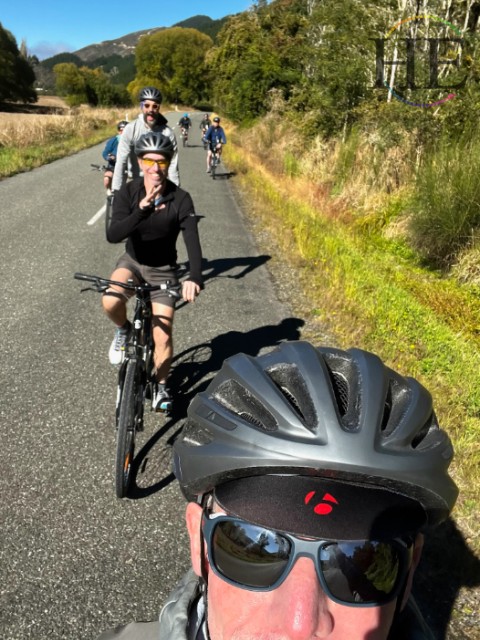
Our first adventure is a fairly easy day of biking to help you adjust after your flights. We’ll cruise ever so slightly downhill, following a mountain stream, passing orchards full of ripening Kiwi fruit, apples of all types, pears, and even towering hops about to be harvested. The apples give way to coastal flats, with rides along the bay, ending for lunch at a uniquely Kiwi café filled with some of the loveliest produce to be found. Along the way, we will be in one of New Zealand’s best wine-producing regions, so we may stop for a glass. We’ll be cycling 20-25 miles, almost all of which is slightly downhill. Even if you haven’t biked in two decades, you’ll enjoy this ride. When we return to Nelson, we will each receive a medium-sized duffel bag to pack gear into for our short 3-day / 2-night adventure in Abel Tasman National Park that starts tomorrow. Our main luggage will be stored until we return to Nelson on the evening of Day 5.
Day 3: Kayak or Hike along Opalescent Abel Tasman Bay
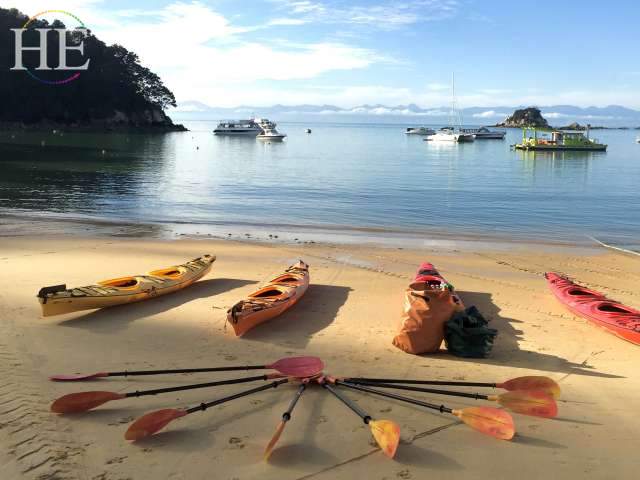
The next morning, we’ll take a lighter load with us as we head for our three-day adventure along the aquamarine shores of nearby Abel Tasman National Park. Our days will be filled with sea-kayaking, hiking, and/or boating (let us know which you prefer in advance, but you can opt into different options daily) as we explore the coastal regions of the park. We’ll enjoy two nights of lodging at comfortable sea-side inns overlooking the bay and meals of locally sourced, organic ingredients. And don’t forget the custom of a break for morning and afternoon tea! Our luggage will be forwarded each day while we carry only small items, snacks, and lunch on our backs (if hiking) or in our kayaks. If you’re not up to hike or kayak, you can opt into regularly scheduled boat transfers from lodge to lodge.
No one who visits this breathtaking park forgets the diverse scenery: native forests and streams, tree-fern-filled grottos, massive granite sea heads, and turquoise waters lapping at golden beaches. While kayaking or hiking through this wonderland, you’ll also delight in the melody of New Zealand’s native birds. We might spy little blue penguins coming ashore to nest or dolphins darting past the end of your paddle. Highlights always include the antics of New Zealand Fur seals and their pups if the prevailing winds allow us to see them in the Tonga Island Marine Reserve.
We will most likely kayak today (about 4.5 hours today, plus breaks). If you haven’t kayaked before, don’t worry, we use stable two-person sea kayaks. With a little instruction and practice, you’ll soon be comfortable paddling the gentle waters of Tasman Bay. We paddle from Kaiteriteri or Marahau, gliding cove to cove. First, we pass Split-Apple Rock, then Apple Tree Cove, Watering Cove, and slide by the bird-song-filled Adele Island. We will have several stops en route, including lunch and perhaps a swim before we arrive at our lodge in Torrent Bay. There, our hosts will greet us with a warm Kiwi hello, fresh appetizers, and a hot shower.
If you’d rather hike today, you’ll enjoy a guided walk from Marahau across beaches and around headlands on New Zealand’s famed Abel Tasman Track, often joining your fellow kayaking crew at one of the many beaches for lunch, before hiking down into Anchorage Bay and on to our lodge nearby. And if you grow tired and would rather relax on one of those pristine beaches instead of hike, you can usually do so and simply catch a later boat into the lodge.
Day 4: Island-hopping in a Kayak
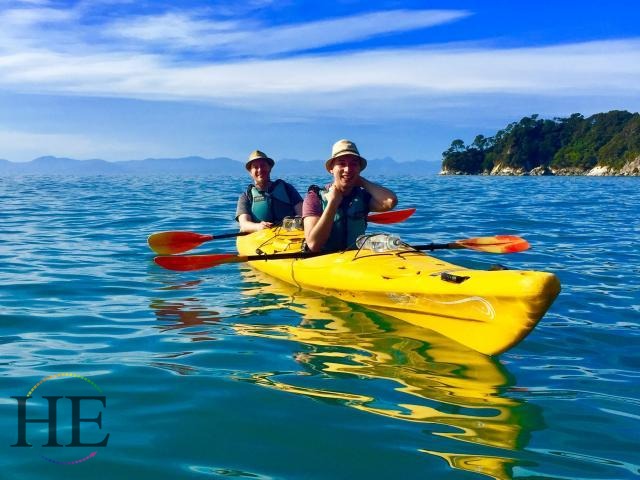
Grab a cuppa of coffee and wander out to the beach in front of our lodge, where you can watch the sunrise across Tasman Bay while keeping an eye out for rays as they scoot along the shallow water near the beach. Then a full, hearty breakfast is served at the lodge. Most of us will kayak again today, gliding past wind-sculpted islands and then onto the golden beach of a sparkling lagoon to look for starfish or perhaps explore the Tonga Arches that are carved deeply through the granite. Along the way, our guides will help us identify seabirds and will tell us of the Maori and early settler impact on the area. Don’t be surprised if you see seals playing in the surf this afternoon as your kayak ripples through the gentle waves.
Our kayaking ends today at Onetahuti Beach, where we’ll rejoin our hikers and together hike across Tonga Saddle and into tonight’s lodge at Awaroa Inlet. Our lodge, Meadowbank, is a replica of the original large farmhouse built here by settlers, beautifully sited, with a panoramic view of the estuary and sea. Expect about four hours of kayaking, plus 1.5 hours of hiking.
Hikers today will enjoy walking through the tea trees and native beech forests to rocky overlooks, picturesque waterfalls, and even across one of New Zealand’s famous suspension bridges before rejoining the kayakers for the final walk across Tonga Saddle to our lodge at Awaroa.
Day 5: Across Awaroa Estuary and into Totaranui
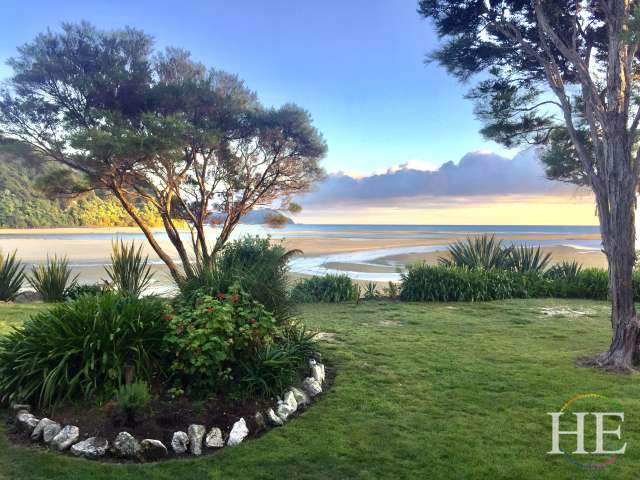
After breakfast, we pack our lunches and then hike a few hours across a magnificent estuary (tides permitting), through tree-fern grottos, and across a few picturesque beaches until we arrive at Totaranui, where we relax and explore until catching our return boat ride early afternoon. Once on board, we enjoy a two-hour cruise past the dozens of coves and beaches that we kayaked and hiked by over the last two days. Late this afternoon, we’ll return to our hotel in Nelson.
Day 6: The Renewal of Christchurch
From Nelson, we fly to the largest city on the South Island, Christchurch, which is in age of renewal after severe earthquakes over a decade ago destroyed a huge swath of the original stone commercial buildings in its core. That fresh spirit also fuels new businesses, art and even the food scene. What was once the most English of cities outside of England now rebuilds itself with Kiwi zeal. And yet, much of the charming old remains, including great parks and gardens, and tourists punting down the Avon River. We will explore and wander with our local guide this afternoon. And then check into our central hotel for two nights.
Day 7: Akaroa: Exploring Nature and Kayaking with Dolphins, Seals, and Penguins
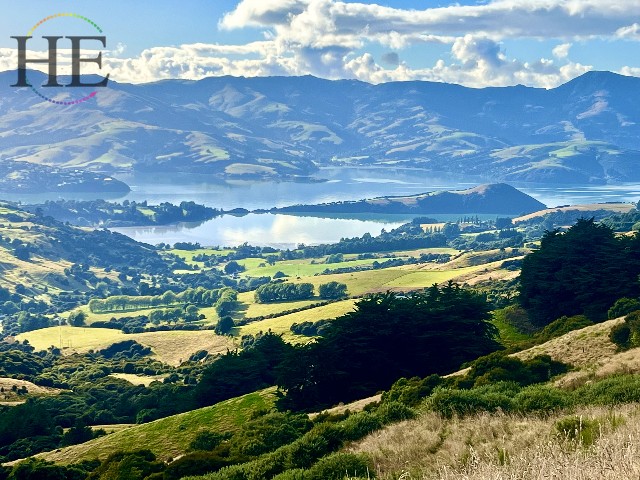
On ocean’s edge just south of Christchurch stands the Banks Peninsula, a giant caldera created by two extinct volcanoes, now collapsed on one side. Small and large inlets from the Pacific create quite stunning valleys in the mountainous terrain. Our day out will include walks as well as time on the water exploring the scenic hillside and marine reserves. The steep cliffs and deep waters provide shelter to Hector’s Dolphins. They are the smallest dolphins in the world, and among the rarest. Hopefully, New Zealand fur seals will be sunning on nearby rocky shores. And we might luck into the smallest penguins in the world too, the White-flippered Penguin.
Akaroa itself is the village set in the inlet, the only French settlement in New Zealand. It maintains that French flair. And we will enjoy a late lunch at one of its many cafes before returning to Christchurch for the night.
Day 8: Driving to the Southern Alps, Glacial Lakes, and then Soak under the Dark Southern Skies
We will depart Christchurch this morning, starting our journey southwest to the mountain jewels of Wanaka and Queenstown. Along the way, however, we have some great stops. Less than four hours away is Tekapo, a small village perfectly sited at the foot of a cerulean, milky blue lake filled by glacial meltwater from the nearby high mountain peaks. This area is the McKenzie country, noted for its broad vistas and drier climate in these high plains set in the rain shadow of the formidable Southern Alps. Enjoy a hike up Mt John, returning to a leisurely soak in Tekapo hot pools, located on the lake’s edge. With enough notice, we might be able to book you on a horse ride for an hour or two-and-a-half hours if you have an interest (additional charge).
This region is a designated international dark sky area. And tonight, after sunset, we return to Tekapo Springs for a guided star-gazing experience looking into the skies. Here in the Southern hemisphere the skies are quite different for most of us, but there are a few of the same constellations, like Orion, although he appears upside down. Even the Milky Way can be more fully seen here in the Southern hemisphere. Helping us discover the Southern Cross, and more distant sights through telescopes, our guides will also share stories and legends. Then we can relax on a floating hammock in one of the hot pools while we search the skies and soak up the star light from above.
Day 9: Wanaka – A Mountain Jewel
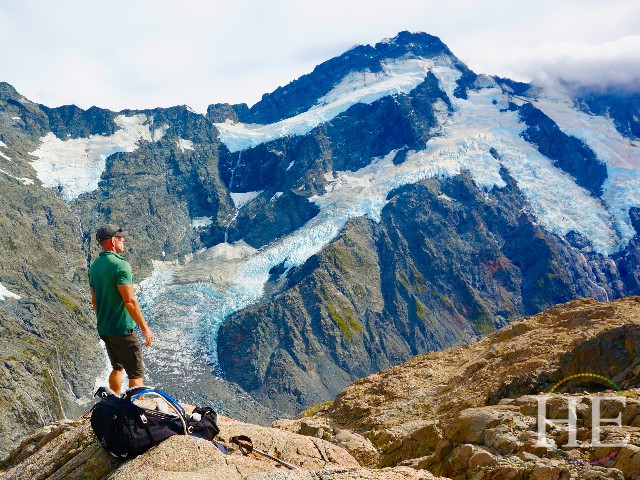
The tallest peak in New Zealand is nearby, known to the local Mäori as Aoraki, cloud piercer! It is surrounded by many other peaks that are almost as tall, creating an alpine wonderland of jagged peaks and snow-encrusted mountain spears shooting into the sky. The famed Kiwi adventurer, Sir Edmund Hillary, trained here for his world-record-setting climb up Mt Everest.
We will enjoy more a leisurely walk or two in these steep glacial valleys, hopefully with great vistas of Aoraki/Mt Cook piercing through the clouds. And if time allows, we will visit the The Sir Edmund Hillary Alpine Centre, a tribute to the legendary explorer and humanitarian.
After our hike, we will drive along another wonderfully blue glacial lake, across the high basin and over Lindis Pass, eventually making our way into Wanaka.
We enjoy three nights in the quaint mountain village of Wanaka, enjoying a wealth of activities. Perched on yet another huge glacial lake, with Mount Aspiring National Park rising behind it, Wanaka offers great views and all types of sports on land, lakes, and rivers, and in the air.
We’ll arrive in time for a quick walk above our hotel to view the layout of the town, then we’ll settle in for a relaxing dinner. Afterward, take a walk along the lakefront and through the quaint downtown, stopping at Kai Waka Pai or Cafe Paradiso for a nightcap.
Day 10: An Alpine Jewel – Hiking Rob Roy Glacier
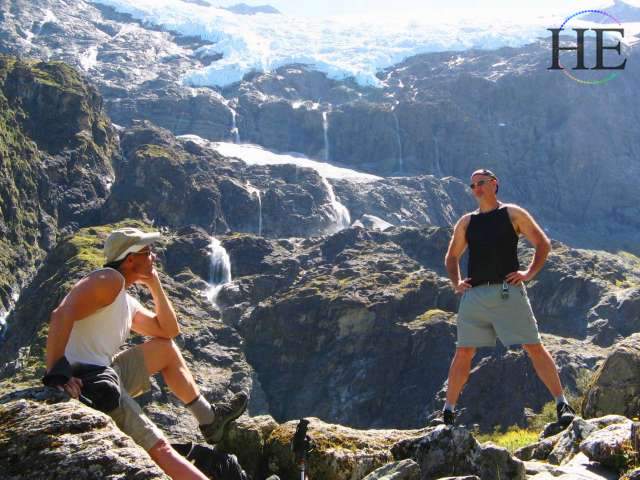
Today we take you to an alpine jewel in the Matukituki River valley, one of our guide’s favorite alpine valleys in New Zealand. Less than half an hour from Wanaka carved wide by ancient glaciers and framed by towering peaks deep in Mt Aspiring National Park, the lower portions of the valley pasture sheep, cattle, and imported Red Stag Deer, while the higher ridges sparkle with ice caps, remnant snow-pack, and small glaciers. A moderate hike of a few hours takes us just above the treeline, where we will have spectacular views across to a hanging glacier clinging tightly to the steeps of Rob Roy Peak (8,550 feet). Rarely is such alpine scenery available without a multi-day trek and we are sure that you’ll enjoy the dozens of waterfalls tumbling over the cliffs as it melts from the ice, including an 800-foot wonder, and occasionally tumbling small and large chunks of ice, calving of the glacier.
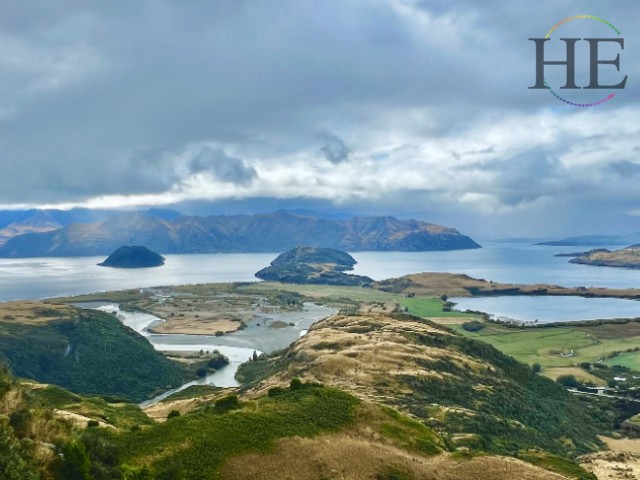
If you would prefer a lighter activity today, you can sign up for one of the many other activities offered. Biking, wine tours, or even a full day of paragliding lessons on Mt. Iron, overlooking the lake, at a site known for its steady winds. Or have a relaxing wander around town, perhaps a hike or bike ride on a nearby trail then read a book on the shores of glacially-carved Lake Wanaka.
Day 11: Wonders of Wanaka or a Flight to Milford Sound
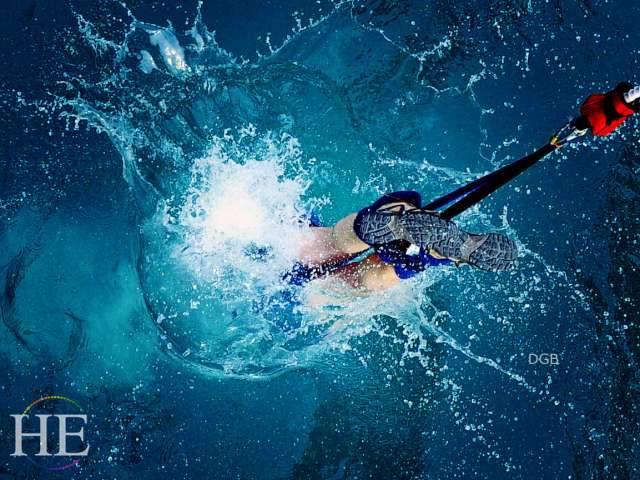
Today is a free day to allow you to choose your activity and enjoy more of this beautiful part of New Zealand. While biking, hiking, lake kayaking, and even rock climbing are all on offer, many clients choose to have some downtime today to enjoy our wonderful lodge, get a massage, and remind themselves that this is, after all, a vacation.
If you are up for more Kiwi adventure, we suggest considering a flight across the peaks to the mighty fjord on the southwest coast, Milford Sound. Or if you have a strong attraction to adrenaline and one of the best activities offered in New Zealand, you can’t miss a day of canyoning.
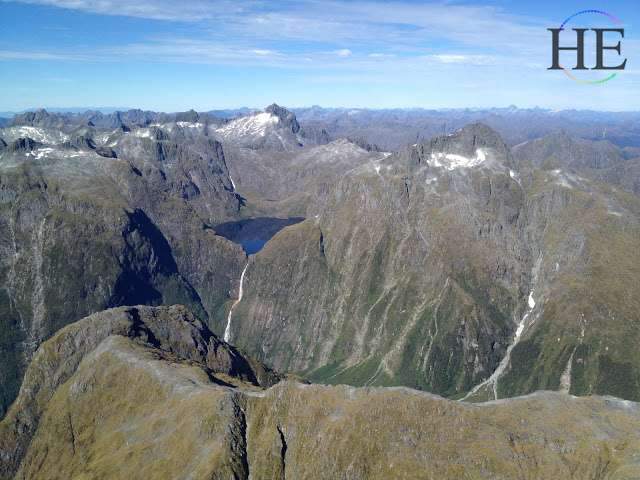
The small craft flight to Milford Sound is a 45-minute panorama of ice fields, jagged peaks, and 800-foot waterfalls to what Rudyard Kipling described as the eighth wonder of the natural world. On arrival in the fjord, you board a medium-sized tourist boat and cruise near fur seals basking in the sun and under Mitre Peak rising a full mile above the water. You’ll then fly back to Wanaka, usually arriving back by early afternoon. The flight is weather-dependent and if the weather doesn’t cooperate today, you can try for Milford again when we’re in Queenstown.
Alternatively, if you are reasonably fit and adventurous, then we strongly urge you to try a sport you may never have heard of: Canyoning (known in North America as canyoneering).
After a 40-minute hike up a fairly steep trail, you don a wetsuit, then step down to a crystal stream that over the millennia has carved its way deep into the bedrock. Now, you’ll simply follow this stream and carved canyon winding steeply down the mountainside in a series of slots, pools, and all types of waterfalls.
There are three basic canyoning techniques: jump, slide, rappel. Soon you’ve got the hang of them — or so you think. But in the natural environment of the canyon, every situation offers its own peculiarities.
Nature has created a water wonderland that outshines the best man-made water parks. Along the way, you can rest behind the waterfalls and take in this otherworldly grotto of moss, ferns, and falling water that explodes sun rays into magical rainbows.
Day 12: A Long Rubber Band – Bungy Jumping into Queenstown
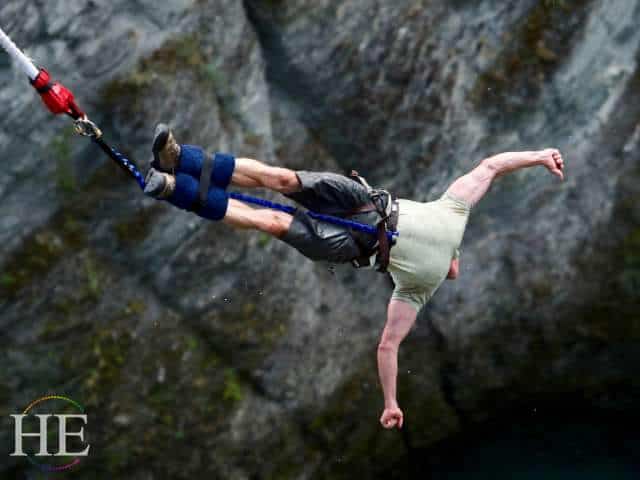
Early risers watch a sunrise illuminating the mountains of Mount Aspiring National Park before enjoying our last breakfast in Wanaka. Today’s drive past historic Cadrona brings us to a stunning perch on the Crown Range Saddle high above the Kawarau River valley overlooking Queenstown and another glacially-carved lake, Lake Wakatipu.
Once we’ve descended from the Crown Range Saddle, we arrive in another gold heritage town, Arrowtown. Here, we’ll collect our bikes and enjoy a bike ride on the trails following the Arrow River down to our next adrenaline-rush activity: the most anticipated and talked-about Wild Kiwi event. And also the briefest. The bungy jump lasts perhaps 30 seconds from the heart-stopping moment you step into thin air until you’ve stopped bobbing up and down sufficiently to be hauled into the pick-up raft below. But the adrenaline will keep pumping for hours.
It’s all deceptively easy. Walk onto the Kawarau suspension bridge, present your ticket, and sit down on the platform. The always hunky and friendly jumpmaster wraps a towel around both your ankles, ties a sturdy sling to it, and clips you to the bottom of a bungy cord (essentially a very long – and thick – rubber band, but if they called it that, nobody would sign up). Stand up, walk to the edge — and now it’s up to you.
What’s your style? A graceful swan dive is a classic exit. A camera captures the critical moment, and just within our group, we see quite a range. One steps off upright, his hands pressed in front of him as if in prayer; another scrunches up in sheer terror. Our 64-year-old steps off as nonchalantly as if going out to buy a loaf of bread. Two guys admit to having been firmly instructed by their mothers not to jump: one does it anyway; the other obeys Mom. (Our advice for future travelers: Don’t tell Mom your plans until after the trip. That way, you can have fun without worrying her.)
Bungy jumping got its start right here at the Kawarau Suspension Bridge, outside Queenstown. A.J. Hackett no longer offers a free jump to anyone who will take the plunge nude; too many people accepted that promotional offer. But the 140-foot bungy jump is free for participants in our tour, clothed or naked.
However — to answer the most frequently asked question about Wild Kiwi — no, you don’t have to make the jump. It’s free — but it’s optional.
Our day is not yet over! After our bungy, we arrive in the acclaimed adventure capital of the Southern Hemisphere, Queenstown, our home for the next two nights. The town is set between craggy peaks and along the shores of a pristine lake, with a great mix of gardens, galleries, cafes, as well as mild to extreme activities of all types.
This evening, a few of us will go out on the town and see what Queenstown has to offer. With its adventure activities during the summer and world-class skiing in the winter, there’s a lot to look at and even quite a few nightspots to visit. What an end to an exciting day!
Day 13: Queenstown Beauty and Adventure
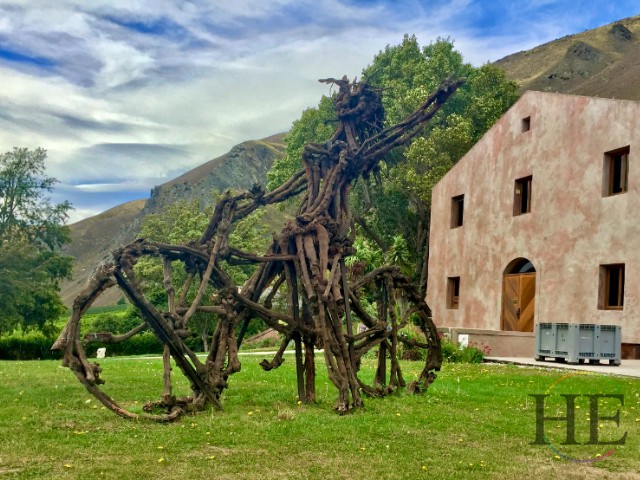
This morning is on your own to explore Queenstown with numerable possibilities available, from rafting, jet-boating, or biking, to luxury vineyard tours or local walks. Our guide will assist you in reviewing the many options on offer in and around Queenstown and help you decide how to fill this last day of your tour. A good introduction to the area is the gondola ride to the top of Bob’s Peak, 1400 feet above town. Sip a drink at the restaurant as you watch bungy jumpers hurl themselves from The Ledge, a precarious platform jutting into space, or paragliders sail above the lake.
Bungy jumping started in Queenstown, and every year some nut in Queenstown comes up with a new adrenaline sport. A few of these are activities that we’re happy to skip. (If you want to roll down the mountain inside a giant inflatable ball called a Zorb, please reserve it yourself.)
Those who want excitement without sweating today can zoom within inches of jagged overhanging rocks on one of the famed Shotover Jet boats. These remarkable boats, powered by jet rather than a propeller, can go through water a mere four inches deep, and the pilots take great delight in blasting full speed toward a looming boulder, then turning a full 180-degrees within a single boat length. Or take a calmer boat ride and add a relaxing few hours of bike riding: grab your coffee and cruise 45-minutes across the lake with a bike, then ride fourteen kilometers along dirt/gravel farm paths, following the lakeshore and stopping for sun, photos, and perhaps a picnic, until you arrive at Walter Peak Station, a fully-restored, historic sheep station. Then return to Queenstown from there on the restored steamship TSS Earnslaw, which makes several trips across the lake each day.
If you’re a whitewater fan, this afternoon is a good time for whitewater rafting on Class-III and IV rapids. Depending on river conditions and water levels, you can raft one of two nearby rivers. The wild and untamed Shotover River starts with a shuttle over a mountain pass, then along a gold digger’s road built in the 1870s, now somewhat improved – the drive is an adventure itself! Once on the beautifully clear river, this rafting trip is more technical than just a river with huge rapids. Challenging and unique, you will paddle hard through six series rapids, including pinball alley, then raft through 800 feet of semi-darkness as you pass through the Oxenbridge Tunnel, a historic diversion tunnel built by gold miners. Or raft the Kawarau, the largest commercially rafted river in New Zealand. Here we pass under the Chard vineyards, and through four sets of rapids. We’ll paddle under the bungy jumpers on the Kawarau Bridge, culminating in the unforgettable Dog Leg Rapids. On the Kawarau, there are sometimes opportunities for cliff jumping, and to swim through smaller rapids.
This evening, we’ll come together and celebrate one last time as we end our two-week vacation together at our closing dinner at one of Queenstown’s finest restaurants.
Day 14: Departure
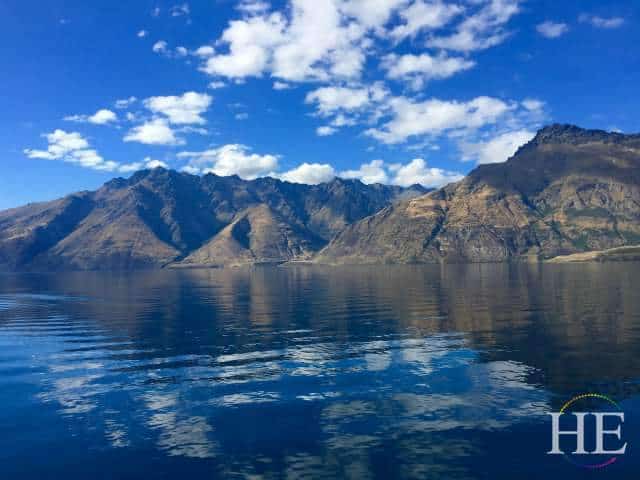
The hardest thing about our trips is saying goodbye to a wonderful group of new friends. As we make our way home from Queenstown, however, there’s one thing you can be sure of: active vacations like this one draw a special type of person. We depart knowing that many of us will see one another yet again.
Price Includes
Price includes: All group ground transportation, in and starting in Christchurch and finishing in Queenstown; Flight from Nelson to Christchurch; All hotels and accommodations in double occupancy; HE Travel tour director accompanying the group from Nelson to Queenstown; 11 breakfasts, 8 lunches, and 7 dinners that often include a glass or two of local wine; One wine-tasting; Biking near Nelson and near Queenstown; Kayaking and/or hiking and boating for 3 days at Abel Tasman National Park; Coastal hikes; Walks and kayaking in Akaroa; Stargazing in hot pools; a hike by Aoraki/Mt Cook with a guide and later to see Rob Roy Glacier; Sightseeing visits to waterfalls and other vistas along our route around the island; and, of course, the famed bungy jump. HE Travel provides complimentary Medical & Evacuation Insurance for every US Resident on our group tours who does not have other coverage.
Not included: Airfare from home to Nelson and from Queenstown to home; Airport transfers on initial arrival/departure; Souvenirs, snacks, admissions, alcohol; Meals and beverages not listed here; Optional or additional activities not listed in itinerary, or listed as optional or additional, such as horse riding, canyoning, flight & cruise at Milford Sound, and whitewater rafting; Gratuities for tour director and local guides; Expenses relating to mandated CoVid requirements or restrictions for travel to/from/within New Zealand. Requirements change rapidly, so be sure to check online for current requirements.
Optional Tour Choices:
$250 Canyoning
$125/$220 1-hour Horse Ride/2.5 hour Horse Ride
$195 Whitewater Rafting
$TBA Flight to/from Milford Sound & Fjord Cruise
The price of activities that most will participate in are included, including general hikes, Abel Tasman and Akaroa hiking and kayaking, two bike rides, and bungy jump are INCLUDED.
Extensions
We are happy to help clients arrange a stop for few days in Auckland on arrival, including a fantastic day of vineyard tours and wine tastings on a boutique island, the perfect antidote to jetlag. Or to stay after the trip in/around Queenstown to enjoy multi-day bike or horse treks, walks, etc. Or a stop in Sydney from Queenstown before flying home. For those seeking a few days on a South Pacific beach, we can arrange a stop-over while crossing the Pacific in French Polynesia either before or after the tour, where we would suggest three or four days on Tahiti and Moorea or even at the more exclusive Bora Bora.
Tour Insurance
We strongly recommend the purchase of Trip Cancellation and Interruption insurance to protect your vacation investment in case of unforeseen circumstances such as flight delay, illness, or injury. Click Here to learn more about our Insurance partner.
FAQ
www.tranzscenic.co.nz
https://www.intercity.co.nz/bus-pass/flexipass/
Please call for the names and phone numbers of references in your area, 305-294-8174.

